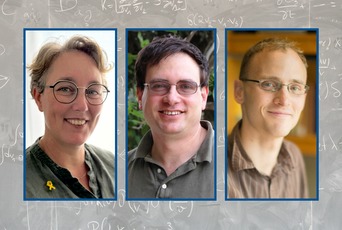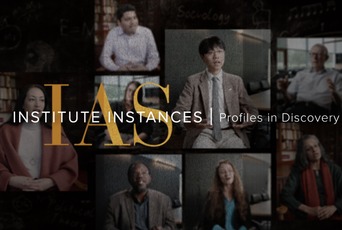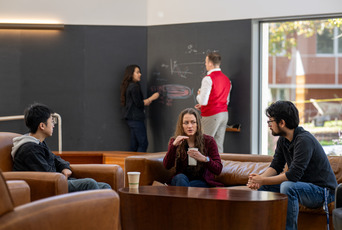IAS Welcomes 267 Visiting Scholars for 2024–25
Press Contact
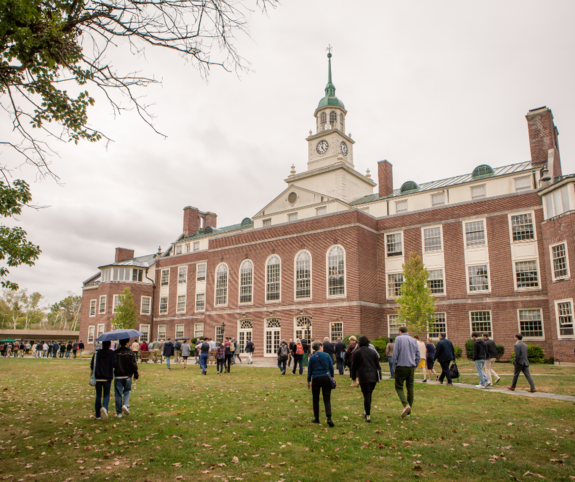
The Institute for Advanced Study commenced its 2024–25 academic year on September 23, 2024, welcoming scholars from around the globe to its storied campus. The 267 visiting scholars, who began arriving earlier in the month, represent 35 nations and more than 130 institutions. Each is selected by the Institute’s permanent Faculty based on the promise of their research, spanning the sciences and humanities. This year’s cohort, ranging from postdocs to distinguished professors, will work alongside the 26 permanent Faculty and 22 Emeriti, all of whom are preeminent in their respective fields.
The beginning of the academic year also sees three new permanent Faculty in the School of Mathematics commence their IAS appointments: Irit Dveer Dinur (theoretical computer science), Elon Lindenstrauss (dynamical systems), and Aaron Naber (geometric analysis). These world-leading mathematicians bring unique expertise to the Institute’s scholarly community and further elevate the pursuit of fundamental knowledge at IAS.
All scholars are based within one of the Institute’s four Schools—Historical Studies, Mathematics, Natural Sciences, and Social Science. While collaboration across disciplines has long been a pillar of Institute scholarship, this year marks the establishment of the Jonathan M. Nelson Center for Collaborative Research, which will further expand the Institute’s capacity for discovery across fields.
During the 2024–25 academic year, the Schools of Social Science and Mathematics will conduct concentrated research, convening specialists from around the world to share perspectives from a diverse array of fields.
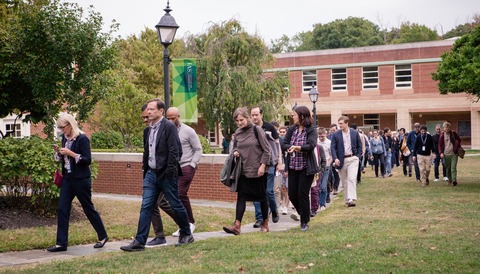
The theme seminar of the School of Social Science is titled “The Politics of Migration and Displacement as a Form of Life.” While much has been written on immigration and asylum, on migrants and refugees, the seminar will address many other questions that are left to be explored. Among these are: What are the historical convergences and variations in the modes of government that regulate migration statuses and the living conditions of the displaced? How are the contemporary politics of border control shaped by colonial past, continuing practices of racial discrimination, technologies of surveillance and selection, and the transnational externalization of migration governance? How do people on the move invent individual and collective tactics of circumvention and strategies of resistance? The theme seminar will be led by Didier Fassin, James D. Wolfensohn Professor in the School, and Visiting Professor David Owen, who serves as a professor in politics at the University of Southampton.
The School of Mathematics will host a special year on algebraic and geometric combinatorics. Past IAS scholar and Princeton mathematics professor June Huh will serve as Distinguished Visiting Professor in the School, helping to organize a range of academic activities and workshops.
The following four scholars, each of whom you can read more about, represent a unique cross-section of this year’s class:
- Celia Sánchez Natalías, William D. Loughlin Member in the School of Historical Studies, conducts research on ancient Mediterranean magical practices, with a specific focus on lead curse tablets, or defixiones, from the Roman period. Her project at IAS will reedition a collection of erotic and circus curse tablets from North Africa.
- In the School of Mathematics, von Neumann Fellow Ellen Eischen employs algebraic, analytic, and geometric approaches to uncover patterns in numerical data that transcend cultures and bridge disparate fields of mathematics. Her collaborations have also helped to introduce public audiences to the creative side of mathematics.
- Beatrix Muehlmann, Member in the School of Natural Sciences, is developing tractable quantum gravity models in two and three dimensions to illuminate the evolution of our dynamic universe. Her work not only describes gravity through the principles of quantum mechanics, but also provides clues as to the long-term fate of the universe.
- E. Tendayi Achiume, Ashvin B. Chhabra and Daniela Bonafede-Chhabra Member in the School of Social Science, focuses on the international legal frameworks that govern migration, racism, and xenophobia. She plans to expand her scope of analysis beyond nation states to transnational corporations during her time at IAS.
Learn more about our scholars and their research here.
Glimpse the IAS experience through a newly debuted series, Institute Instances, featuring one- to two-minute snapshots of scholars, administrators, and visitors discussing their projects.
Learn more about how to submit an application for the 2025–26 academic year here.
About the Institute
The Institute for Advanced Study has served as one of the leading independent centers for theoretical research and intellectual inquiry since its establishment in 1930, advancing the frontiers of knowledge across the sciences and humanities. From founding IAS Faculty Albert Einstein, Erwin Panofsky, and John von Neumann to influential figures Emmy Noether, George Kennan, and J. Robert Oppenheimer to the foremost thinkers of the present, IAS is dedicated to enabling independent inquiry and fundamental discovery.
Each year, the Institute welcomes more than 250 of the world’s most promising post-doctoral researchers and scholars who are selected and mentored by a permanent Faculty, all of whom are preeminent leaders in their fields. Among present and past Faculty and Members, there have been 35 Nobel Laureates, 44 of the 62 Fields Medalists, and 23 of the 27 Abel Prize Laureates, as well as winners of the Turing Award; the Pulitzer Prize in History; the Wolf, Holberg, and Kluge prizes; and many MacArthur and Guggenheim fellows, among other honors.
